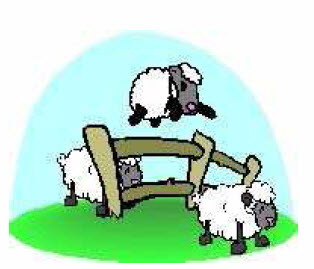Counting Sheep
Time Limit: 2000/1000 MS (Java/Others) Memory Limit: 32768/32768 K (Java/Others)
Total Submission(s): 1706 Accepted Submission(s): 1104
Problem Description
A while ago I had trouble sleeping. I used to lie awake, staring at the ceiling, for hours and hours. Then one day my grandmother suggested I tried counting sheep after I'd gone to bed. As always when my grandmother suggests things,
I decided to try it out. The only problem was, there were no sheep around to be counted when I went to bed.

Creative as I am, that wasn't going to stop me. I sat down and wrote a computer program that made a grid of characters, where # represents a sheep, while . is grass (or whatever you like, just not sheep). To make the counting a little more interesting, I also decided I wanted to count flocks of sheep instead of single sheep. Two sheep are in the same flock if they share a common side (up, down, right or left). Also, if sheep A is in the same flock as sheep B, and sheep B is in the same flock as sheep C, then sheeps A and C are in the same flock.
Now, I've got a new problem. Though counting these sheep actually helps me fall asleep, I find that it is extremely boring. To solve this, I've decided I need another computer program that does the counting for me. Then I'll be able to just start both these programs before I go to bed, and I'll sleep tight until the morning without any disturbances. I need you to write this program for me.

Creative as I am, that wasn't going to stop me. I sat down and wrote a computer program that made a grid of characters, where # represents a sheep, while . is grass (or whatever you like, just not sheep). To make the counting a little more interesting, I also decided I wanted to count flocks of sheep instead of single sheep. Two sheep are in the same flock if they share a common side (up, down, right or left). Also, if sheep A is in the same flock as sheep B, and sheep B is in the same flock as sheep C, then sheeps A and C are in the same flock.
Now, I've got a new problem. Though counting these sheep actually helps me fall asleep, I find that it is extremely boring. To solve this, I've decided I need another computer program that does the counting for me. Then I'll be able to just start both these programs before I go to bed, and I'll sleep tight until the morning without any disturbances. I need you to write this program for me.
Input
The first line of input contains a single number T, the number of test cases to follow.
Each test case begins with a line containing two numbers, H and W, the height and width of the sheep grid. Then follows H lines, each containing W characters (either # or .), describing that part of the grid.
Each test case begins with a line containing two numbers, H and W, the height and width of the sheep grid. Then follows H lines, each containing W characters (either # or .), describing that part of the grid.
Output
For each test case, output a line containing a single number, the amount of sheep flock son that grid according to the rules stated in the problem description.
Notes and Constraints
0 < T <= 100
0 < H,W <= 100
Notes and Constraints
0 < T <= 100
0 < H,W <= 100
Sample Input
2 4 4 #.#. .#.# #.## .#.# 3 5 ###.# ..#.. #.###
Sample Output
6 3
简单dfs
#include<stdio.h>
int h,w;
char a[100][100];
void dfs(int x,int y){
if(x-1>=0 && a[x-1][y]=='#')
{ a[x-1][y]='.'; dfs(x-1,y);}
if(y-1>=0 && a[x][y-1]=='#')
{ a[x][y-1]='.'; dfs(x,y-1);}
if(x+1<h && a[x+1][y]=='#')
{ a[x+1][y]='.'; dfs(x+1,y);}
if(y+1<w && a[x][y+1]=='#')
{ a[x][y+1]='.'; dfs(x,y+1);}
}
int main(){
int t,i,j,num;
scanf("%d",&t);
while(t--){
scanf("%d%d",&h,&w);
for(i=0;i<h;i++) scanf("%s",a[i]);
num=0;
for(i=0;i<h;i++)
for(j=0;j<w;j++){
if(a[i][j]=='#'){
a[i][j]='.'; dfs(i,j);
num++;
}
}
printf("%d\n",num);
}
return 0;
}